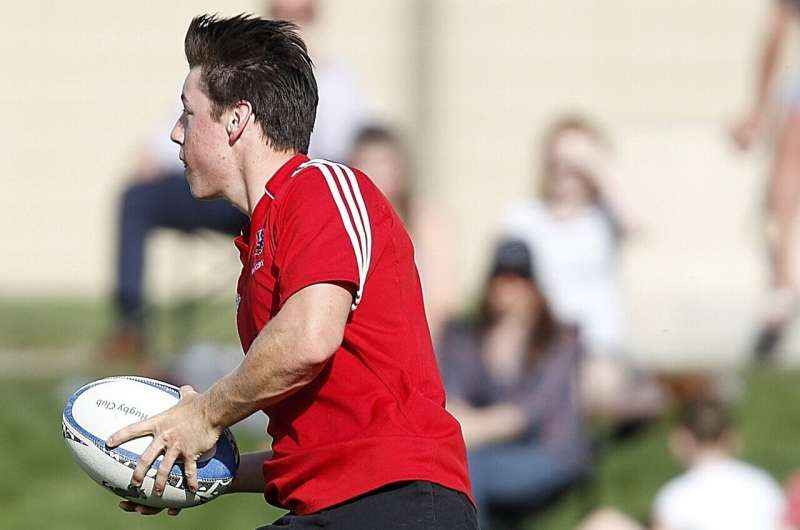This article has been reviewed according to Science X's editorial process and policies. Editors have highlighted the following attributes while ensuring the content's credibility:
fact-checked
peer-reviewed publication
trusted source
proofread
Multiple concussions in rugby players associated with higher levels of proteins linked to neurodegenerative disease

Retired rugby players who have suffered multiple concussions have higher levels of certain proteins in their blood, which may make them more prone to developing diseases such as motor neuron disease (MND), according to a new study.
The research, led by Durham University, shows that it may be possible to measure specific key biomarkers. These biomarkers can indicate disease or predict possible future disease in the blood of athletes who have suffered multiple traumas to the head.
This is the first study to explore a range of specific biomarkers as part of the UK Rugby Health project.
If athletes' blood can be tested and monitored for these specific proteins, it may be possible to diagnose them early for neurodegenerative diseases and provide early interventions.
The study is published in the International Journal of Molecular Sciences.
The retired male rugby players who took part had a substantial history of concussions during their playing career. Their blood samples contained more indicators of neural damage, known as serum exosomes, compared to a control group of fellow athletes who had not suffered head trauma.
Researchers found higher levels of specific proteins called serum t-tau and tau-p181, which play a crucial role in the development of Alzheimer's and MND, compared to the healthy control group.
They also found that the rugby players who had been concussed in their career had lower levels of a retinoid transport protein called RBP-4, which plays an important role in the development and functioning of the brain. The researchers suggest this could offer a rationale for developing retinoid-based medications.
They strongly recommend monitoring of players of contact sports after they retire, especially if they have suffered concussions.
In recent years, much effort has been put into developing biomarkers in blood that could potentially help with early diagnosis and monitoring of neurodegenerative diseases such as Alzheimer's.
Senior author on the study Professor Paul Chazot, from Durham University's Department of Biosciences, said, "The long-term effects of concussions on rugby players, football players, boxers as well as retired military personnel is a major concern, because of the link to neurodegenerative diseases.
"This study gives us the beginnings of a biomarker toolbox to periodically monitor the brain health of retired contact sportspeople, particularly those with a history of concussion during their career.
"It will also pave the way for the introduction of the necessary interventions to minimize the development of future neurodegenerative disease. We have a range of interventions currently in advanced stages of development."
As the interventions will need to be tested in clinical trials, the researchers stress that it could still be a few years before they could become available.
Co-author Dr. Karen Hind, Honorary Fellow at the Wolfson Research Institute for Health and Wellbeing at Durham University, initiated the UK Rugby Health study. She added, "This is a crucial development in the field and we're calling for sustained efforts to define the pathways leading to concussion-induced neurodegenerative diseases.
Alix Popham, who was not involved in the study, is a retired international rugby player. He achieved 33 caps for Wales, including playing in two World Cups and winning a Six Nations Grand Slam. Alix retired in 2011 and in April 2020 was diagnosed with probable chronic traumatic encephalopathy (CTE) and early onset dementia as a result of traumatic brain injury suffered in his rugby career. He's one of the co-founders of the charity Head for Change.
He said, "This is more evidence that big changes need to happen to protect current rugby players. World Rugby needs to get their heads out of the sand and in turn protect the game."
The study analyzed the blood samples of 56 male professional athletes seven years after retiring from their sport. This included 30 retired rugby players who had suffered more than five concussions in their playing career. They were compared with 26 retired rugby players without concussions and retired athletes from non-contact sports.
The researchers are now looking to secure urgent funding to carry out a follow-up study with the players. This will give a clearer idea of the current levels of the relevant proteins in the players' blood, including any changes, their current health status and potential health outcomes.
The biomarkers included were total tau (t-tau), three forms of phosphorylated tau (p-tau), serum amyloid Alpha (SAA), beta-amyloid (Aβ42), retinol-binding protein 4 (RBP-4), retinol, and neurofilament light (Nf-L), and exosome size.
The study was conducted by Durham University with contributions from researchers at Curtin University (Australia), University of Western Australia (Australia), Auckland University of Technology (New Zealand) and University of Auckland (New Zealand).
This latest study is the first from the UK Rugby Health Project looking at biomarkers. The Project was set up in 2016 as an extension to the 2012 New Zealand Rugby Health Project.
This research follows on from previous studies that demonstrated a significant connection between the number of musculoskeletal conditions and reduced mental health status in retirement, and levels of concussions in players' careers.
More information: Concussion-Related Biomarker Variations in Retired Rugby Players and Implications for Neurodegenerative Disease Risk: The UK Rugby Health Study, International Journal of Molecular Sciences (2024).

















